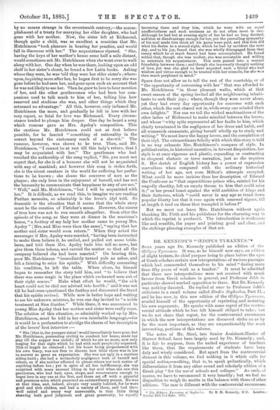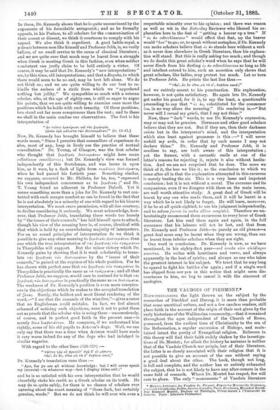DR. KENNEDY'S " (EDIPIIS TYRANNITS." SOME years ago Dr. Kennedy
published an edition of the Tyrannus. It was, as he himself now says, an edition of slight texture, its chief purpose being to place before the eyes of Greek scholars certain new interpretations of various passages which had commended themselves to his mind "during more than fifty years of work as a teacher." It must be admitted that these new interpretations were not received with much favour from Greek scholars in general, and Professor Jebb in particular showed marked opposition to them. But Dr. Kennedy was nothing daunted. He replied at once to Professor Jebb's criticisms in a small volume called Stud& Sophocica, Part II.; and he has now, in this new edition of the ITcliptes Tyramius, availed himself of the opportunity of reprinting and restating his own arguments. He speaks with some regret of the contro- versial attitude which he has felt himself obliged to take ; but we do not share that regret, for the controversial excursuses in which the new interpretations are discussed strike us as by far the most important, as they are unquestionably the most interesting, portions of this volume.
The notes of Mr. Steel, late Senior Assistant-Master of Harrow School, have been largely used by Dr. Kennedy ; and, it is fair to suppose, from the united experience of teachers like these, that the requirements of students have been duly and wisely considered. But apart from the controversial element in this volume, we find nothing in it which calls for special notice,—nothing, that is, to speak pedantically, which differentiates it from any other sound and scholarly edition of a Greek play "for the use of schools and colleges." As such, of course, we have to recommend it very heartily; but we feel no disposition to weigh its merits in the balance with those of other editions. The case is different with the coatroversial excursuses.
• The GEdipus Tyranny, of &Thoth's. By B. R. Kennedy, D.D. London: George Bell and Bons. BM.
In these, Dr. Kennedy shows that he is quite unconvinced by the arguments of his formidable antagonist ; and as he formally appeals, in his Preface, to all scholars for the communication of
their assent or dissent, we think it courteous to comply with his appeal. We also think it expedient. A good battle-royal, a polemic between men like himself and Professor Jebb, is, we verily believe, of no small service to the cause of classical literature ;
and we are quite sure that much may be learnt from a struggle when Greek is meeting Greek in this fashion, even when neither combatant can justly claim to be held entirely a victor. Of course, it may be said that Dr. Kennedy's "new interpretations" are, by this time, old interpretations; and that a dispute, to which there would seem to be no end, may be best left alone. We do not think so ; and we are quite willing to do our best to re- kindle the embers of a strife from which we "apprehend nothing but jollity." We sympathise so much with a veteran scholar, who, at the age of eighty-one, is still so eager to argue his points, that we are quite willing to examine once more the positions which he holds with such tenacity. Of these positions, two stand out far more conspicuous than the rest ; and to these we shall in the main confine our observations. The first is his interpretation of
",5 radio 44weipostri scal Ties lu,u4sopas CiScras OptI) AciAlOTa vv 130VIlEIM4TWV." (v. 44-45.)
Now, Dr. Kennedy has brought himself to believe that these
words mean," Since I perceive that counsellors of experience do also, most of any, keep in lively use the practice of mutual consultation." Dr. Young, of Glasgow, was the first scholar who thought that t,i4ePopci; /30.0■Ev1ex■ might here mean conciliates consiliornm ; but Dr. Kennedy's view was formed independently of this Scotchman, and was borne in upon him, as it were, by a flash of light from all,14P.40EIV 13611XEL%,14GCTLC, when he had passed his fortieth year. Something similar, we suppose, occurred to Mr. Shilleto, for he, too, "expressed his own independent concurrence as to Eu,Eapopci; and Dr.
T. Young found an adherent in Professor Dalzell. Yet it seems something more than a joke for Dr. Kennedy to rest con- tented with such meagre comfort as can be found in the fact that he is not absolutely in a minority of one with regard to his bizarre interpretation. We must crave permission, with all due courtesy, to decline considering it seriously. We must acknowledge, how- ever, that Professor Jebb, translating these words too loosely by "the issues of their counsels," has laid himself open to attack, though his view of the meaning here is, of course, identical with that which is held by an overwhelming majority of interpreters.
For on no sound principles of interpretation do we think it possible to give any other meaning to is,acpo0; lecsol:w.‘kras, than one which the true interpretation of ssi; tuf.apopee; vlos wocenticrato in Thucydides will support. But the minor victory which Dr. Kennedy gains by showing that it is weak scholarship to trans- late zei; liovT.sv,tarrom by the "issues of their counsels," is gained at the expense of his whole position. For he has shown with perfect ease that 1* EtqapopZ; ri:n■ .7,occ-y,acirros in Thucydides is practically the same as TCi 7:pci./14Mret ; and all that Professor Jebb, we suppose, would care to contend for is that 7%74 TZ13. /300tEVACiTenlY is practically the same as 1"
The weakness of Dr. Kennedy's position is even more conspicu- ous in the objections which be makes to the accepted translation
of ''(:)scc;. Surely, the boldest and most literal rendering of the word,—" I see that the counsels of the wise live,"—gives a sense
that no Englishman could mistake. In fact, we feel almost ashamed of noticing such objections, were it not to point them out as proofs that the scholar who is using them—unconsciously, of course, and in perfect good faith in the present case—is
merely iats aletOts)tierves. He compares, if we understand him rightly, some of his old pupils to Acta3on's dogs. Well, we can
only say that there was a time when Actseon would have made it very warm indeed for any of the dogs who had indulged in similar vagaries.
With regard to the other lines (38-329) :— " WCIYTES 'yap 01) fpoveir' We obilii7rOTE Try2 415 &P, ETTO) A Ta Cr' ?ItibilUO Kasai,"
Dr. Kennedy's translation runs thus :—
"Aye, for ye are all without knowledge : but I will never speak my (secrets) —in whatever way—lest I display thine evil ;"
and he is so satisfied with his own interpretation that he would -cheerfully stake his credit as a Greek scholar on its truth. He may do so quite safely, for there is no chance of scholars ever agreeing about the exact meaning of "these dark, but certainly genuine, words." But we do not think he will ever win even a
respectable minority over to his opinion; and there was reason as well as wit in the Saturday Reviewer who likened his ex- planation here to the feat of "getting a beaver up a tree." If " adverbiascens" would effect that feat, up the beaver would "key" to go; or, to speak without metaphor, if Dr. Kennedy can make scholars believe that is stands here without a verb as it never does elsewhere in Greek literature, then his explana- tion will stand. But this is really asking too much ; and though we do doubt this great scholar's word when he says that be will never flinch from his darling cg is adverbiascens so long as life and intellect extend to him, such an assertion only shows that great scholars, like ladies, may protest too much. Let us turn to Professor Jebb. He prints the last line thus :— " Ttme, ttv aro., /.4 k4rhP0.1 KCMG( ;" and we entirely assent to his punctuation. His explanation, however, is not quite satisfactory. Be again lets Dr. Kennedy get under his guard, for it is, to say the least, a questionable proceeding to say that "c is, substituted for the commoner rya, in no way alters the meaning." His rendering is,—" But never will I reveal my griefs, that I say not thine."
Now, these " dark " words, to use Dr. Kennedy's expression, may or may not be genuine. Hermann and other good scholars believe that they are not. But if they are, then their darkness exists but in the interpreter's mind, and the interpretation which sins least against grammar is this :—" I will never unfold my evils, in order that by such means I may not declare thine." Dr. Kennedy and Professor Jebb, it is needless to say, are both aware of this interpretation ; yet the former, with a sarcastic smile at one of the latter's reasons for rejecting it, rejects it also without hesita- tion. And we are not surprised that he does. The more we think of it, the less we like it ; so the conclusion to which we come after all is that the explanation attempted in this excursus is merely beating the air. This is a very lame and impotent conclusion ; but it is not without a moral. The excursus and its companions, even if we disagree with them on the main issues, are well worth attentive study. A great deal of Greek will be learnt by any one who reads them, and it will be learnt in a way which he is not likely to forget. He will learn, moreover, if he be at all quick-sighted, to use his judgment independently, and to refuse jurare in verba ullius nzagistri. Therefore we un- hesitatingly recommend these excursuses to every lover of Greek literature. Let him read them again and again, in the full assurance that his labours will not be lost, and that from Dr. Kennedy and Professor Jebb—to parody an old phrase—a great deal more may be learnt when they are wrong, than can be learnt from inferior scholars when they are right.
One word in conclusion. Dr. Kennedy is now, as we have mentioned, in his eighty-first year—sed cruda viro viridisque senectus. He writes with heartiness and verve, and always apparently in the best of spirits ; and always as one who takes the greatest interest in his subject. We trust that he may long be spared to fight his battles o'er again ; and if a single word has slipped from our pen in this notice that might seem dis- courteous to him, we beg to cancel it with the sincerest of apologies.







































 Previous page
Previous page